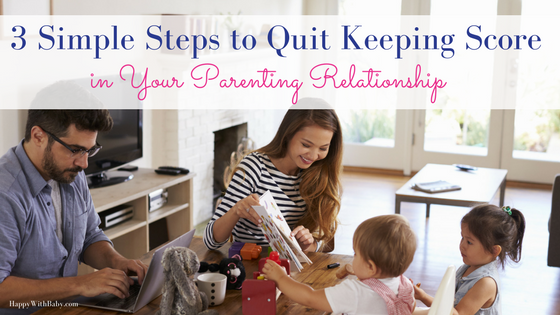3 Simple Steps to Quit Keeping Score in Your Parenting Relationship

Remember back when you had roommates and it was so easy to divvy up the chores list and make sure everyone paid their share of the bills? And if someone wasn’t pulling their weight, it was really clear, right? Everyone knew who the lame roommate was and a simple house meeting could nip it in the bud or that roommate would be finding a new place.
Or, remember back when you and your partner were just dating and you could easily split the bar tab or take turns taking each other out? Both of you could find ways to contribute in ways that made sense for your wallet and your lifestyle.
But, guess what? Something happens when you introduce a baby into your relationship. Those clear-cut lines get blurred and messy.
Suddenly, you can’t compartmentalize your roles quite so easily. It’s an intricate balance of things that ALL need to happen in order to make sure that baby is healthy, safe and happy.
This includes the obvious: diaper changes, feedings, naptimes, doctor appointments, etc. It also includes the not-so-obvious: earning the salary, paying the bills, maintaining the house, calling the insurance company about that surprise medical bill, researching all the possible causes of that weird cough your baby has been doing lately, scheduling tours of daycare centers, getting that promotion or signing that big client, researching life insurance plans, getting the oil changed like clockwork because you really need this car to last you, plus taking breaks so that you can recharge…. The list is endless.
All the cogs and wheels need to work for the machine to run.
The funny thing is, before baby, many of these things just seemed like to-do’s to satisfy our own personal ambitions--getting that raise or having a spotless house. Maybe one person really wants that car to last the next 5 years, but maybe the other would love a reason to buy a new one in spite of the expense. But suddenly, baby arrives, and it becomes all the more important for that old car to last a while. Or, all the more important for you to get that new car because it will be safer and more roomy. The particulars are irrelevant--the point is, it ALL becomes about the baby.
And because one person simply can’t do ALL THE THINGS all by themselves, you have to rely on each other in a way you never have before.
Sleep deprivation begins to affect your memory and your patience. And it can be hard to see the invisible labor being done for you and baby while you’re trying your best to do it all too. And that can feel really crappy for both of you.

Keeping score might be something that inevitably every parenting couple slips into at some point, especially in the beginning. But, hopefully, it’s not a place you’ll stay in long because it’s a game both of you will lose.
It’s a slippery slope that often starts with: “Well, I changed the baby’s diaper last time. It’s your turn.” Or, “I’m already doing X, Y, Z all day. Why can’t you pick up the slack?”
A prime example of this is when my first child was a baby. My husband and I first tried taking turns getting up in the middle of the night to change or feed the baby, but eventually, it got to the point where one of us wouldn’t be roused from sleep enough to hear that the other had gotten up the last time and we’d both be absolutely convinced that, “No, I know for a fact it was me that got up the last time.” (Sleep or, rather, lack of sleep has a way of blurring things like that.)
So, then, we decided to try using a cut-off time. We decided that my husband, a natural night owl, would do the late-night shift with the baby until 2:00 am. Then, after 2:00 am, I’d take over the early morning shift. That worked out for a while, but this also got complicated. What if the baby woke up more often in the morning shift than the evening one or vice versa? What do we do if the baby wakes up at 1:58 am? Who’s turn is it then?
I work with a lot of parenting couples whose lives look something like one parent staying at home with the baby and also working from home while the other works full-time outside of the home. I hear all the time about that juggle, who’s perceived to be doing more, whether things are divided fairly, who’s not getting enough time for x-y-z, or who is afraid they aren’t doing enough and feel like they need to prove or justify how they spent their day.
It can be challenging, but it’s so important to try not to quantify your contributions in that way. It’s not necessarily about who is doing more--it’s just what we do often looks different for each parent.
Once you start keeping score on who is doing what, it puts up a divide between the two of you. And this is where resentment comes in.
Because balance, moms and dads, is a myth. Not to burst anyone’s bubble here, but it needed to be said. There really is no such thing, at least not in the ways we imagine it. Balance is more like a swinging pendulum than a boulder that can’t be moved.
So, knowing that balance is a bit of a misnomer, it becomes easier to see that it doesn’t make sense to keep score of who is doing what. It’s more about understanding and supporting each other through the ripples that parenthood throws at us.
Hearing other person’s perspective and understanding how the other person feels will go a long way to repairing the resentment and reminding you both that you are a team working toward the same goal.
How do we do this? Through good communication, of course.
-
Ask for what you need. Don’t assume that your partner will know that it bugs you if they come home and chill in front of the TV right after work. Don’t also assume that what you are needing help with is obvious to anyone other than you. Speak up.
-
Instead of pointing out what the other person is or isn’t doing, Talk about what you feel. Instead of saying “I’m always doing this or that” or “You always _______”, say “When this happens, I feel _______.” This will completely shift the conversation away from criticism and defensiveness and toward understanding.
-
Ask: How can we adjust? What can we do a little differently to help each other out? There might be ways you can reassign certain tasks to rebalance the workload. Maybe you request that your partner gives you 30 minutes of free time before they decide to chill in front of the TV, for example. But doing things differently might not be something that shifts the workload at all. Sometimes solutions are as simple as daily check-ins with each other to see how things are going, or acknowledging each other’s contributions with gratitude.
There are going to be rough patches in this parenting adventure. There is no doubt will even be times when one of you actually is doing the brunt of the work in certain ways. One thing we parents learn very quickly though is that the work of parenthood is always changing. Nothing lasts forever. But with good communication and some understanding, your relationship with your partner will.
Subscribe
Sign up to get the latest weekly blogs sent straight to your inbox


0 comments
Leave a comment
Please log in or register to post a comment